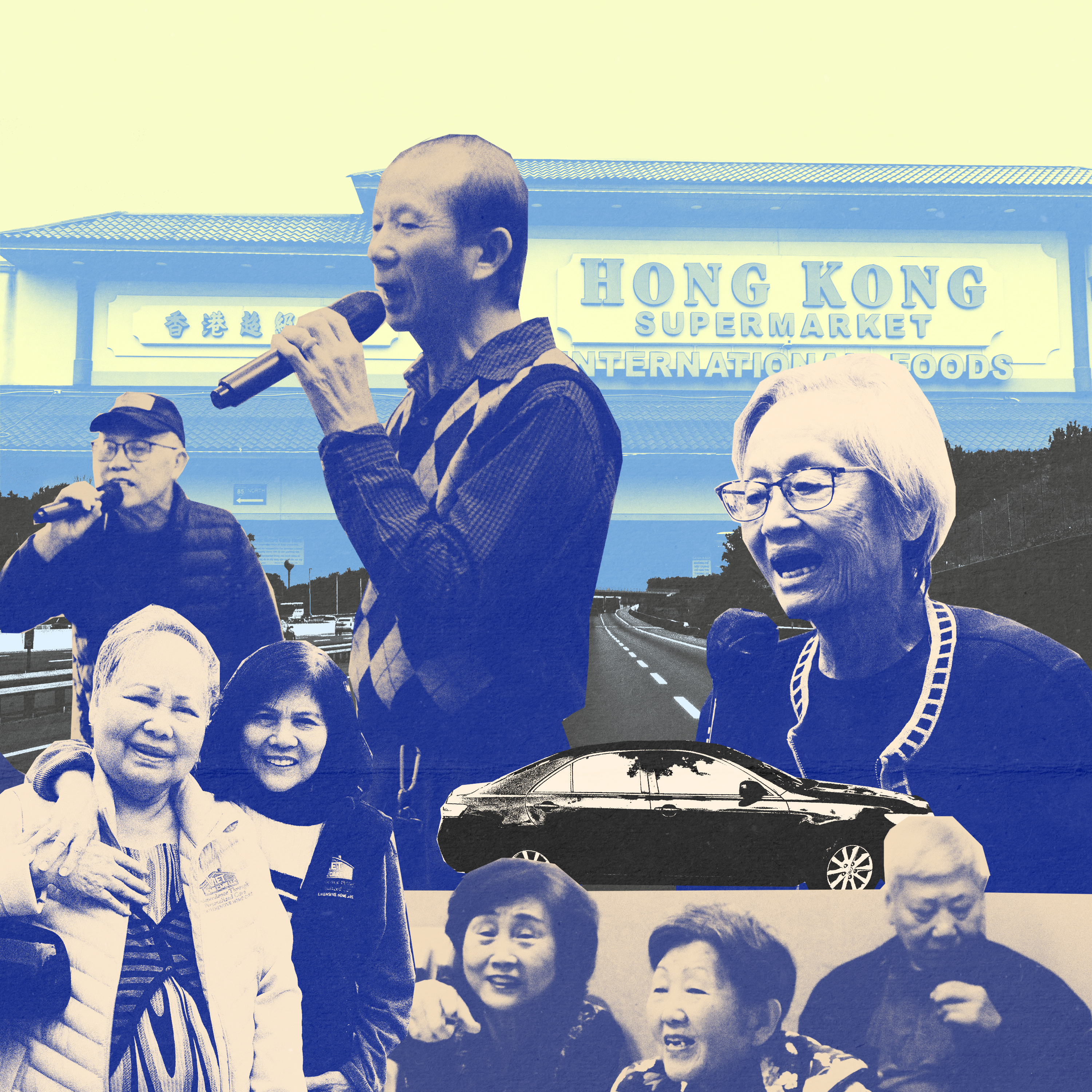Canopy Atlanta asked over 100 Norcross community members about the journalism they needed. This story emerged from that feedback.
This story is also reported by 285 South, a Community Publishing Partner with Canopy Atlanta, and a space dedicated to Metro Atlanta’s growing immigrant and refugee communities. Previously, 285 South founder Sophia Qureshi served as a Canopy Writer-in-Residence.
Like any good karaoke party, it began with technical difficulties.
One Friday morning, inside the Norcross-based office for the Chinese Community Federation of Atlanta (CCFA), over a dozen seniors sat in rows facing a karaoke machine and a screen with Chinese songs queued up on YouTube. They waited expectedly as Lewis Luu, a senior they usually appoint as tech support, fiddled with the karaoke machine’s volume before the singing finally got underway.
“He is the technology master,” said Anna Tam, CCFA’s president.
Six people seated in the back rows were knitting, passing around snacks, and chatting. Two women sporadically clapped along to the beat. At the front, three gentlemen took center stage. Seemingly relishing the spotlight, they passed the microphone to each other, belting out tunes with their eyes closed.
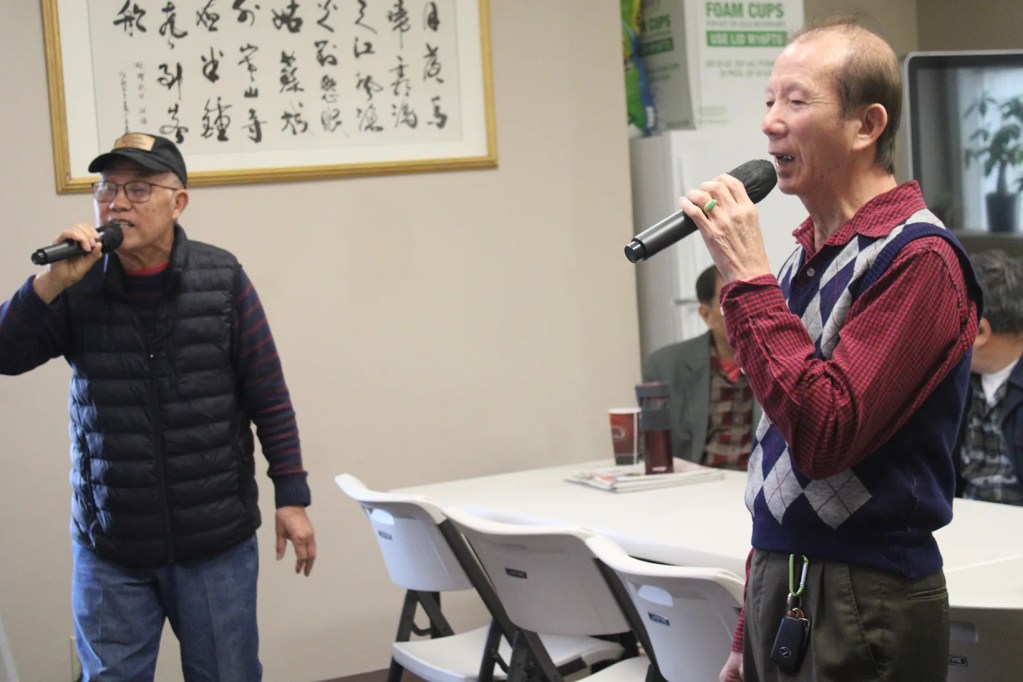
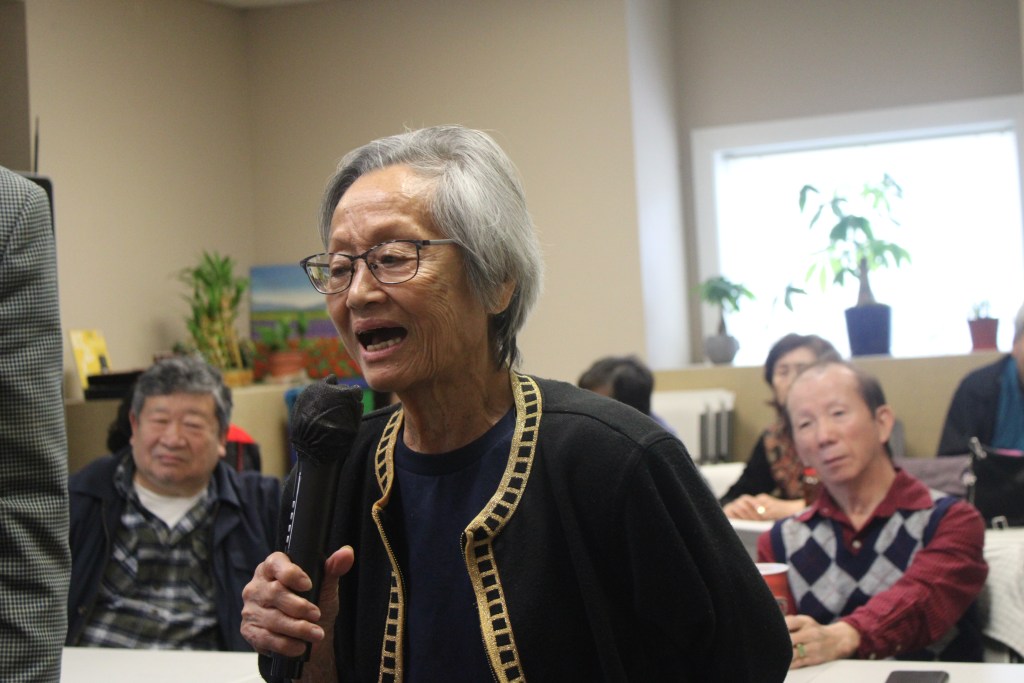
Between them were others, like Theresa Kang, who sang along quietly from her seat. When another senior thrusted a microphone in front of her, she shyly accepted, and made her way to the front of the room.
“I came today because this is the first day for karaoke,” said Kang, who is originally from Taiwan. She lives off Indian Trail Road, and drove 30 minutes northwest to get to CCFA’s office that morning.
This past February, and in less than a week’s notice, CCFA quickly organized the karaoke party after some seniors expressed interest. Although there was a favorable turnout, Kang thinks more seniors would have come if they had transportation.
“If they live too far away, they don’t want to drive,” she said.
But this hasn’t always been the case.
The Center for Pan Asian Community Services (CPACS) is a nonprofit that has been helping individuals, mostly in DeKalb and Gwinnett counties, since 1980. For many years, CPACS provided transportation for its community members. Four green shuttle buses, along with minivans and sedans, assisted community members in getting groceries and making doctor visits.
Anna Tam, now the president of CCFA, used to run the Senior Services program at CPACS. She says that one bus alone would pick up around 50 to 60 seniors from a Chinese supermarket in Duluth and drive them to the CPACS office in Doraville so they could attend any number of activities including exercise classes, Chinese knotting, and drumming.
“CPACS used to provide transportation services to thousands of people, mostly in DeKalb and Gwinnett counties,” said Victoria Huynh, the organization’s former vice president.
However, that all changed when CPACS came under investigation in 2022 after allegations of mismanagement of funds. The organization cut many of its programs and lost vital funding that supported its transportation services.
Now, around 20 people come to CCFA’s senior programs. Tam, who is an unpaid volunteer, says she hasn’t had the time to find funding for transportation.
“Most of them live close by, since they can drive, but not that far,” said Tam.
Less than five miles away from CCFA, across from the Hong Kong Supermarket strip mall off Jimmy Carter Boulevard, is a nondescript office complex where Trinh Pham sits at her desk.
Pham is the executive director of the Atlanta chapter of Boat People SOS (BPSOS), a national nonprofit serving Vietnamese community members. “Of the hundreds of Georgians who BPSOS serves every month, around 70 percent are seniors living in the Gwinnett County area,” Pham explained.
Pham’s own parents migrated from Vietnam in the late ‘90s, and they never drove. “We didn’t have [a] car in Vietnam. We just ride bicycles,” she emphasized.
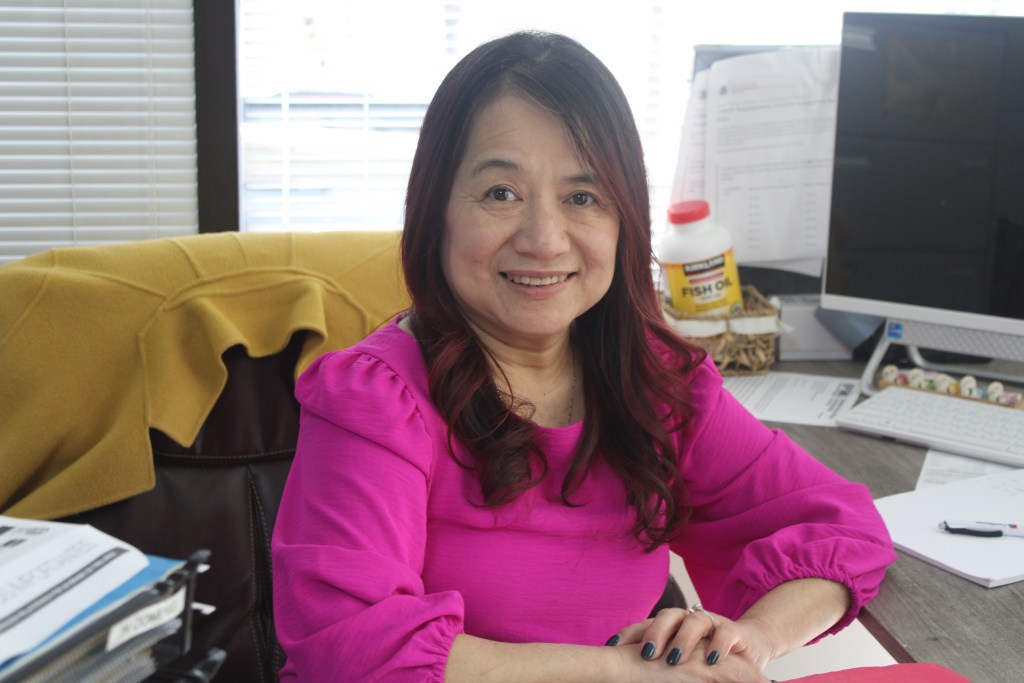
BPSOS provides everything from tax services to preventive health checkups. At one point, BPSOS even offered exercise classes. But, despite many elderly people wanting to participate, attendance was low because they struggled to get there. And although BPSOS does have a grant from Uber that covers the cost of rides to medical appointments, community activities do not qualify.
“We want our seniors to be active, but they couldn’t come to join,” Pham explained. “They said, oh, I don’t have a car, I have no one to drive me.” Therefore, the classes have now ended.
Many seniors rely heavily on others for transportation. Therefore, in order to encourage more participation, the BPSOS office now opens at 8 a.m., instead of 10 a.m. like it used to. This shift allows adult children of seniors to drive their parents in before work.
“Most of the [kids] work in the nail industry. So normally nail salons open late. Early morning if we open, they can take care [of everything] . . . we found [it] very effective early morning,” Pham said.
For the past six years, Thao Tran has worked for Viet Home Care, a company in Norcross that provides care for mostly Vietnamese elders. She says that in any given workweek, she likely spends 10 hours driving such residents around Gwinnett County for grocery store trips and medical appointments.
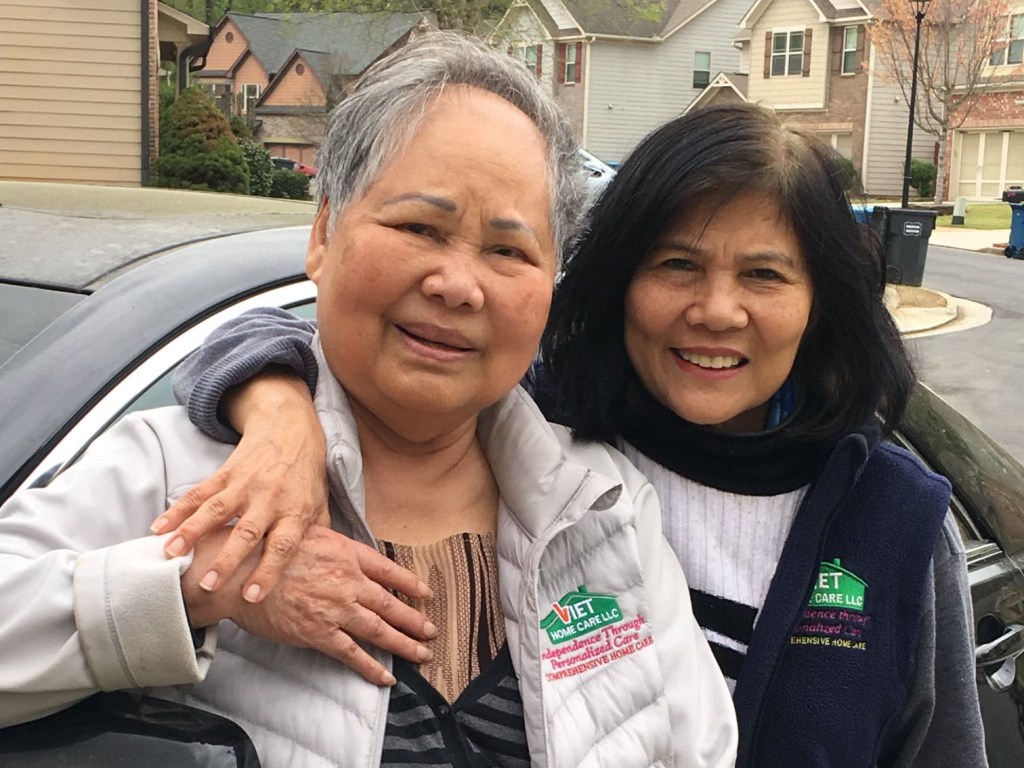
Tran understands that many of these seniors don’t know how to drive, while others consistently depend on their children to transport them. Uber isn’t always an option – especially when they can’t speak English.
“Tôi thích giúp họ đi lại, điều đó mang lại hạnh phúc cho họ,” Tran said, with her daughter Angie translating for her: I like to help them get around, it brings happiness to them.
Tran also said that the company doesn’t reimburse for gas. With steadily increasing inflation, Tran believes she should be paid more. Her starting wage was $9 an hour, and now, six years later, she makes $12.50. “Chỉ thôi là chưa đủ,” she said. That is just not enough.
The Atlanta Regional Commission (ARC), the agency that used to provide federal and state funding to CPACS for its transportation services, no longer supports any immigrant-specific organization with transportation, according to spokesperson Paul Donsky. However, Donsky also notes that the ARC does provide $5.3 million dollars a year to nine counties in the metro area, including Gwinnett, to support senior transportation services.
When asked by 285 South whether ARC had connected with Asian-serving nonprofits, like BPSOS and CCFA, to let them know about transportation services available in Gwinnett, Donsky said, “We have not yet made outreach, but would be very interested in doing so and will ensure that their information is included in our database of resources that is available to the public at Empowerline.org.”
Empowerline is what the Atlanta Regional Commission has set up to support seniors in Georgia looking for a range of services—from information about assisted care living facilities, to whether paratransit is available in their county.
Donsky said nearly 2,500 residents accessed transportation services through the website in 2023. The website is available in multiple languages, including Arabic, simplified Chinese, and Spanish, though not in Vietnamese.
Gwinnett County’s transit system, Ride Gwinnett, offers non-medical emergency and “quality of life” transportation for seniors and assisted, disabled adults. “Quality of life trips include grocery stores, prescription pick-ups, and trips that are considered essential for their livelihood,” explains Deborah Tuff, Gwinnett County Government’s media relations and strategy manager. Exercise classes, social gatherings, and even art classes qualify as well.
Tam, CCFA’s president, went with some seniors to a seminar on Gwinnett County’s transportation services over a year ago. But, she said, from her understanding, the county’s assistance “does not help much because the transportation is not door-to-door.” Door-to-door service, she said, is limited to those with disabilities.
Pham said she didn’t know about any of the county-provided services for seniors. Neither did Tran, of Viet Home Care.
Victoria Huynh, the former vice president of CPACS, says that many community members who used to access services through CPACS have called to inquire about finding transportation. But she’s not sure what to tell them.
“When you have this entity that has been doing this work and building that for over a decade or so, and all of a sudden it just goes away—literally—almost overnight, there’s this shock,” Huynh said. “It is a challenge, because I don’t know of many other services that can fill in immediately,” she added.
Finding a solution to this problem begins with naming the situation for what it is. That’s why Huynh has been advocating with funding agencies, like the Department of Transportation and ARC, about the problem. But the issue doesn’t seem to be a priority. She said that no one is tracking data around needs at the moment.
“I said, we’re in the middle of a crisis. And I know, for some of our leaders who don’t sit in that space, they may not see it as the highest priority because maybe they don’t serve the communities . . . day in, day out,” said Huynh.
Huynh is also working with smaller nonprofits through the Georgia AAPI Hub, a network she founded in 2022, bringing together grassroots groups in the Asian community, to help build out their capacity and apply for grants.
The building capacity, resource sharing, and the development of new transportation services all take time. The latter is what Pham really wishes for the most––better public transportation for seniors in Gwinnett County.
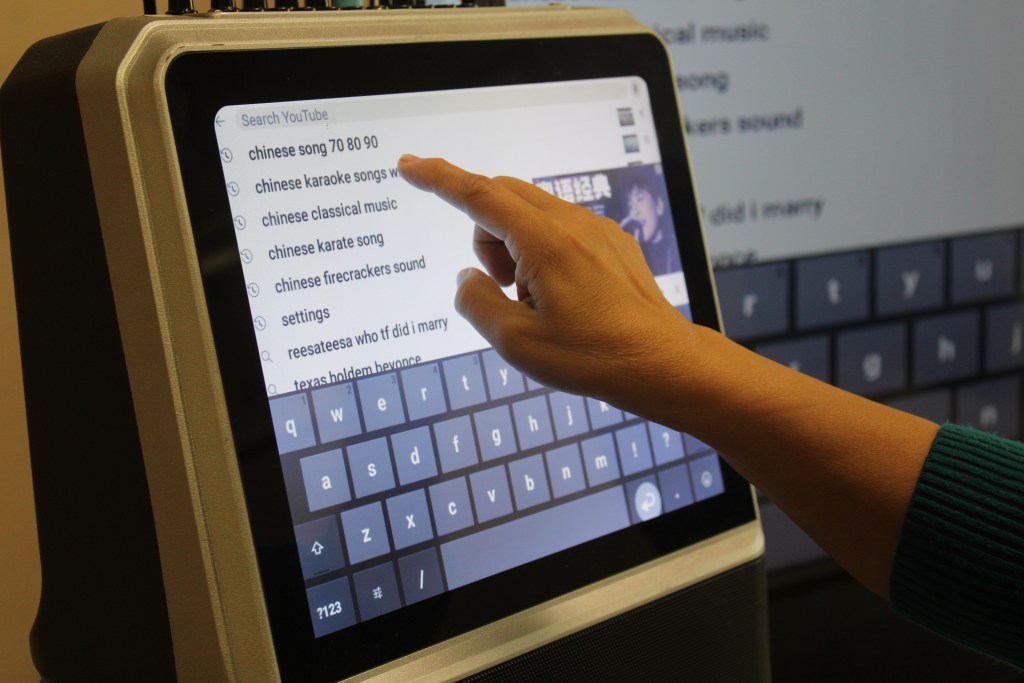

Meanwhile, back at CCFA’s office, Kang went back to her seat, and continued to sing along from the audience, a smile lighting up her face.
The organization’s first karaoke party was such a success that seniors want the party to continue on a weekly basis. But there is just one problem (in addition to a lack of available transportation, of course). Tam received an email from the office’s property management, complaining that the karaoke party was too noisy.
Rather than cancel karaoke altogether, Tam moved the parties from Fridays to Sunday mornings.
“Hopefully down the road, no complaints from the offices,” she said, laughing.
Editor: Christina Lee
Fact Checker: Tonya Abari
Canopy Atlanta Reader: Stephanie Toone
